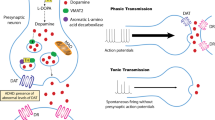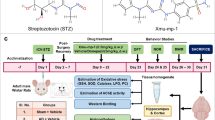Abstract
Phosphodiesterase-4 (PDE-4) regulates the intracellular level of cyclic adenosine monophosphate. Recent studies demonstrated that PDE-4 inhibitors can counteract deficits in long-term memory caused by aging or increased expression of mutant forms of human amyloid precursor proteins, and can influence the process of memory function and cognitive enhancement. Therapeutics, such as ketamine, a drug used in clinical anesthesia, can also cause memory deficits as adverse effects. Targeting PDE-4 with selective inhibitors may offer a novel therapeutic strategy to prevent, slow the progress, and, eventually, treat memory deficits.
Similar content being viewed by others
Abbreviations
- PDE-4:
-
Phosphodiesterase-4
- cAMP:
-
Cyclic adenosine monophosphate
- UCR:
-
Upstream conserved regions
- LTP:
-
Long-term potentiation
- PKA:
-
Protein kinase A
- CREB:
-
cAMP response element binding protein
- CBP:
-
CREB-binding protein
- ERK:
-
Extracellular regulated protein
References
O’Donnell, J. M., & Zhang, H. T. (2004). Antidepressant effects of inhibitors of cAMP phosphodiesterase (PDE4). Trends in Pharmacological Sciences, 25, 158–163.
Burgin, A. B., Magnusson, O. T., Singh, J., Witte, P., Staker, B. L., Bjornsson, J. M., et al. (2010). Design of phosphodiesterase 4D (PDE4D) allosteric modulators for enhancing cognition with improved safety. Nature Biotechnology, 28, 63–70.
Houslay, M. D. (2001). PDE4 cAMP-specific phosphodiesterases. Progress in Nucleic Acid Research and Molecular Biology, 69, 249–315.
Omori, K., & Kotera, J. (2007). Overview of PDEs and their regulation. Circulation Research, 100, 309–327.
Davis, T. G., Peterson, J. J., Kou, J. P., Capper-Spudich, E. A., Ball, D., Nials, A. T., Podolin, P. L., et al. (2009). The identification of a novel phosphodiesterase 4 inhibitor, 1-ethyl-5-{5-[(4-methyl-1-piperazinyl)methyl]-1,3,4-oxadiazol-2-yl}-N-(tetrahydro-2H-pyran-4-yl)-1H-pyrazolo[3,4-b]pyridine-4-amine (EPPA-1), with improved therapeutic index using pica feeding in rats as a measure of emetogenicity. Journal of Pharmacology and Experimental Therapeutics, 330, 922–931.
Ghavami, A., Hirst, W. D., & Novak, T. J. (2006). Selective phosphodiesterase (PDE)-4 inhibitors: a novel approach to treating memory deficit? Drugs in R&D, 7, 63–71.
Alberini, C. M. (2009). Transcription factors in long-term memory and synaptic plasticity. Physiological Reviews, 89, 121–145.
Sweatt, J. D. (1999). Toward a molecular explanation for long-term potentiation. Learning and Memory, 6, 399–416.
Xia, M., Huang, R., Guo, V., Southall, N., Cho, M. H., Inglese, J., et al. (2009). Identification of compounds that potentiate CREB signaling as possible enhancers of long-term memory. Proceedings of the National Academy of Sciences of the United States of America, 106, 2412–2417.
Wood, M. A., Kaplan, M. P., Park, A., Blanchard, E. J., Oliveira, A. M., Lombardi, T. L., et al. (2005). Transgenic mice expressing a truncated form of CREB-binding protein (CBP) exhibit deficits in hippocampal synaptic plasticity and memory storage. Learn and Memory, 12, 111–119.
Lee, Y. S., Bailey, C. H., Kandel, E. R., & Kaang, B. K. (2008). Transcriptional regulation of long-term memory in the marine snail Aplysia. Molecular Brain, 1, 3.
Wang, H., Ferguson, G. D., Pineda, V. V., Cundiff, P. E., & Storm, D. R. (2004). Overexpression of type-1 adenylyl cyclase in mouse forebrain enhances recognition memory and LTP. Nature Neuroscience, 7, 635–642.
Li, Y. F., Cheng, Y. F., Huang, Y., Conti, M., Wilson, S. P., O’Donnell, J. M., et al. (2011). Phosphodiesterase-4D knock-out and RNA interference-mediated knock-down enhance memory and increase hippocampal neurogenesis via increased cAMP signaling. Journal of Neuroscience, 31, 172–183.
Vecsey, C. G., Baillie, G. S., Jaganath, D., Havekes, R., Daniels, A., Wimmer, M., et al. (2009). Sleep deprivation impairs cAMP signalling in the hippocampus. Nature, 461, 1122–1125.
Zhang, H. T., Crissman, A. M., Dorairaj, N. R., Chandler, L. J., & O’Donnell, J. M. (2000). Inhibition of cyclic AMP phosphodiesterase (PDE4) reverses memory deficits associated with NMDA receptor antagonism. Neuropsychopharmacology, 23, 198–204.
Davis, J. A., & Gould, T. J. (2005). Rolipram attenuates MK-801-induced deficits in latent inhibition. Behavioral Neuroscience, 119, 595–602.
Rutten, K., Wallace, T. L., Works, M., Prickaerts, J., Blokland, A., Novak, T. J., et al. (2011). Enhanced long-term depression and impaired reversal learning in phosphodiesterase 4B-knockout (PDE4B−/−) mice. Neuropharmacology, 61, 138–147.
Navakkode, S., Sajikumar, S., & Frey, J. U. (2004). The type IV-specific phosphodiesterase inhibitor rolipram and its effect on hippocampal long-term potentiation and synaptic tagging. Journal of Neuroscience, 24, 7740–7744.
Rutten, K., Prickaerts, J., & Blokland, A. (2006). Rolipram reverses scopolamine-induced and time-dependent memory deficits in object recognition by different mechanisms of action. Neurobiology of Learning and Memory, 85, 132–138.
Alarcon, J. M., Malleret, G., Touzani, K., Vronskaya, S., Ishii, S., Kandel, E. R., et al. (2004). Chromatin acetylation, memory, and LTP are impaired in CBP ± mice: A model for the cognitive deficit in Rubinstein-Taybi syndrome and its amelioration. Neuron, 42, 947–959.
Peng, S., Zhang, Y., Ren, B., Zhang, J., & Wang, H. (2011). Effect of ketamine administration on memory consolidation, p-CREB and c-fos expression in the hippocampal slices of minor rats. Molecular Biology Reports, 38, 2401–2407.
Sweatt, J. D. (2004). Mitogen-activated protein kinases in synaptic plasticity and memory. Current Opinion in Neurobiology, 14, 311–317.
Kida, S., Josselyn, S. A., Pena de, O. S., Kogan, J. H., Chevere, I., Masushige, S., et al. (2002). CREB required for the stability of new and reactivated fear memories. Nature Neuroscience, 5, 348–355.
Peng, S., Zhang, Y., Zhang, J., Wang, H., & Ren, B. (2010). Effect of ketamine on ERK expression in hippocampal neural cell and the ability of learning behavior in minor rats. Molecular Biology Reports, 37, 3137–3142.
Houslay, M. D., & Baillie, G. S. (2003). The role of ERK2 docking and phosphorylation of PDE4 cAMP phosphodiesterase isoforms in mediating cross-talk between the cAMP and ERK signalling pathways. Biochemical Society Transactions, 31, 1186–1190.
Acknowledgments
This work was supported by the National Natural Science Foundation of China (Grant No. 81000469) and the Scientific Foundation from Health Office of Jiangsu province (Grant No. H201070).
Author information
Authors and Affiliations
Corresponding author
Rights and permissions
About this article
Cite this article
Peng, S., Sun, H., Zhang, X. et al. Effects of Selective Phosphodiesterases-4 Inhibitors on Learning and Memory: A Review of Recent Research. Cell Biochem Biophys 70, 83–85 (2014). https://doi.org/10.1007/s12013-014-9930-7
Published:
Issue Date:
DOI: https://doi.org/10.1007/s12013-014-9930-7




